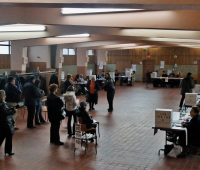Nancy Rosenblum’s Items contribution is based on her response to Charles Taylor’s October Roosevelt House lecture, "Ways Democracy Can Slip Away," and also appears in The Democracy Papers. A member of the Anxieties of Democracy program’s Advisory Committee, Rosenblum reflects on Taylor’s arguments through the lenses of history and political philosophy. She ends on a note of contingent hope, emphasizing that democracy’s contemporary vulnerabilities are related to genuine advances in the quality of democracy over time.



















